(Chinese: 佛說不增不減經)
Translated from Sanskrit into Chinese in the Northern Wei Dynasty by The Indian Tripitaka Master Bodhiruci
Translated from the Chinese Canon, Vol. 16, Text no. 668
Sūtra no. 14 (posted 04/2008)
------------------------------------------------
Thus I have heard:
At one time the Buddha was staying on the Grdhrakūta Mountain, near the capital city [Rājagrha], together with a multitude of 1,250 great bhiksus and innumerable, countless Bodhisattva-Mahāsattvas, in numbers beyond reckoning. At that time Śāriputra the Wise, in the huge multitude, rose from his seat, came before the Buddha, and bowed down at the feet of the Buddha. He then stepped back to sit on one side. Joining his palms, he asked the Buddha, "World-Honored One, since time without a beginning, sentient beings have been transmigrating, through the four modes of birth, to and fro along the six life-paths in the Threefold Realm of Existence, suffering endlessly in life and death. World-Honored One, is this mass of sentient beings, or ocean of sentient beings, increasing or decreasing? I am unable to understand this profound question. How should I answer if someone asks me this question?"
At that time the World-Honored One told Śāriputra, "Very good! Very good! You are able to ask me about this profound meaning because you want to give peace to all sentient beings, to give happiness to all sentient beings, to pity all sentient beings, to help sentient beings, and to give comfort and benefits to sentient beings such as gods and humans. Śāriputra, if you did not ask the Tathāgata, Samyak-Sambuddha, about this meaning, there would be many faults. Why? Then, in present and future times, gods, humans, and all other sentient beings would long undergo distress and damage and lose forever [the opportunity for] all benefits, peace, and joy.
"Śāriputra, the enormously wrong view refers to seeing increase in the realm of sentient beings or to seeing decrease in the realm of sentient beings. Sentient beings that hold this enormously wrong view, because of it, are born without eyes. Therefore, they mistakenly go the evil way in the long night. For this reason, they go down to the evil life-paths in their current lives. Śāriputra, the enormous perilous tribulation refers to one's obstinate adherence to the view of increase or decrease in the realm of sentient beings. Śāriputra, those who are obstinate in their wrong adherence misguidedly walk the evil way in the long night. For this reason, they will go down to the evil life-paths in their future lives.
"Śāriputra, foolish ordinary beings do not see in accord with reality the one dharma realm. Because they do not see in accord with reality the one dharma realm, they invoke the wrong view in their minds, saying that the realm of sentient beings increases or that the realm of sentient beings decreases. Śāriputra, when the Tathāgata is in the world, my disciples will not take this view. However, over 500 years after my parinirvāna, there will be many sentient beings that are foolish and senseless. Although they will remove their hair and beard, donning the three dharma robes, to appear as a śramana in the Buddha Dharma, they will not have within themselves the virtuous ways of a śramana. People of this type are actually not śramanas, but they will claim themselves to be śramanas. They are actually not the disciples of the Buddha though they allege to be, saying, 'I am a śramana, a true disciple of the Buddha.' People such as these hold the view of increase or decrease. Why? These sentient beings follow the Tathāgata's sūtras of provisional meaning because they do not have the Wisdom-eye and are far from the view of emptiness in accord with reality. [Other reasons are] that they do not know in accord with reality what the Tathāgata has realized from His initial resolve [for attaining Buddhahood]; that they do not know in accord with reality how to accumulate the immeasurable virtuous actions for realizing bodhi; that they do not know in accord with reality the immeasurable dharmas acquired by the Tathāgata; that they do not know in accord with reality the Tathāgata's immeasurable power; that they do not know the Tathāgata's immeasurable realm; that they do not believe in the Tathāgata's immeasurable action field; that they do not know in accord with reality the Tathāgata's inconceivable immeasurable command of the dharmas; that they do not know in accord with reality the Tathāgata's inconceivable immeasurable helpful ways; that they are unable to differentiate the Tathāgata's immeasurable distinct states; that they are incapable of entering into the Tathāgata's inconceivable great compassion; and that they do not know in accord with reality the Tathāgata's mahā-parinirvāna.
"Śāriputra, foolish ordinary beings, because they do not have the wisdom developed from hearing the Dharma, adhere to the view of cessation or extinction with respect to the Tathāgata's nirvāna. Because of their perception of cessation or extinction, they claim that the realm of sentient beings does decrease. This is an enormously wrong view and an extremely grave, sinister karma.
"Furthermore, Śāriputra, from the view of decrease, these sentient beings elicit three more views. These three views and the view of decrease, never separated from one another, are like a net. What are these three views? The first is the view of cessation, which means the ultimate end. The second is the view of extinction, which is equated to nirvāna. The third is the view of void nirvāna, which means that nirvāna is ultimately nothingness. Śāriputra, so fettering, so gripping, and so contagious are these three views! From the causes and conditions of the force of these three views, two more wrong views in turn arise. These two views and those three, never separated from one another, are like a net. What are these two views? One view is no motivation, and the other is the view of ultimately no nirvāna. Derived from the view of no motivation are two more views. These two views and the view of no motivation, never separated from one another, are like a net. What are these two views? One view is that engaging in ascetic practices will lead to the truth, and the other is the inversion view, such as taking impurity for purity.
"Śāriputra, from the view that ultimately there is no nirvāna, six more views arise. These six views and the no-nirvāna view, never separated from one another, are like a net. What are these six views? The first is that the world has a beginning; the second is that the worlds has an end; the third is that sentient beings are created by an illusion; the fourth is that there is no suffering or happiness; the fifth is that there no such thing [as transmigration] of sentient beings; and the sixth is that there is no holy truth.
"Furthermore, Śāriputra, these sentient beings, from the view of increase, elicit two other views. These two views and the view of increase, never separated from one another, are like a net. What are these two views? One view is that nirvāna is created, and the other view is that nirvāna suddenly comes about without causes or conditions. Śāriputra, these two views cause the minds of sentient beings to have no wish and no drive to progress energetically in good dharmas. Śāriputra, even if seven Buddha-Tathāgatas, Samyak-Sambuddhas, successively appeared in the world to pronounce the Dharma to the sentient beings that hold these two views, it would be impossible for them to develop any drive to make diligent progress in good dharmas.
"Śāriputra, these two views are the afflictions arising from the roots of ignorance! Such are the view that nirvāṇa is created and the view that it suddenly comes about without causes or conditions!
"Śāriputra, these two views are the extremely evil dharma of enormous fundamental troubles. Śāriputra, from these two views arise all the [wrong] views. These two views and all the [wrong] views, never separated from one another, are like a net. All the [wrong] views include various kinds of views whether internal or external, whether gross, subtle, or in-between, whether of increase or decrease. Śāriputra, these two views, however, depend on the one realm, share the one realm, and are included in the one realm. Foolish ordinary beings, because they do not know and see in accord with reality the one realm, invoke the extremely evil view in their minds, saying that the realm of sentient beings increases or that the realm of sentient beings decreases."
At that time, Śāriputra the Wise, asked the Buddha, "World-Honored One, what is meant by one realm? All foolish ordinary beings, because they do not know and do not see in accord with reality the one realm, invoke the extremely evil, enormous wrong view in their minds, saying that the realm of sentient beings increases or that the realm of sentient beings decreases."
Śāriputra continued, "Very good! World-Honored One, this meaning is too profound for me to understand. I pray only that the Tathāgata will explain to me, to make me understand."
At that time, the World-Honored One told Śāriputra the Wise, "This profound meaning is in the realm of the Tathāgata's wisdom. It is also in the action field of the Tathāgata's mind. Śāriputra, all voice-hearers and Pratyekabuddhas are unable to know, to see, or to observe with their wisdom such profound meaning. Much less can all the foolish ordinary beings speculate [about it]. Only the wisdom of Buddha-Tathāgatas is able to observe, to know, and to see this meaning. Śāriputra, all voice-hearers and Pratyekabuddhas, with all their wisdom, can only believe this meaning out of respect, but they are unable to know, to see, or to observe it in accord with reality. Śāriputra, this profound meaning is in effect the highest truth, and the highest truth is in effect the realm of sentient beings. The realm of sentient beings is in effect the Tathāgata store, and the Tathāgata store is in effect the dharma body. Śāriputra, the meaning of the dharma body, in the Buddha Dharma, explained by me is not apart, not removed, not severed, and not different from the inconceivable virtue and wisdom of the Tathāgata, which are more abundant than the sands of the Ganges.
"Śāriputra, taking the ordinary lamp as an analogy, its brightness and its flame are not apart or removed from each other. As another analogy, the luster and the form of a precious jewel are not apart or removed from each other. The meaning of the dharma body explained by the Tathāgata is the same way. In the Buddha Dharma, it is not apart, not removed, not severed, and not different from the inconceivable virtue and wisdom of the Tathāgata, more abundant than the sands of the Ganges.
"Śāriputra, the dharma body is a dharma of no birth and no death, neither of the past nor of the future, because it is away from the two extremes. Śāriputra, it is not of the past because it is apart from birth, and it is not of the future because it is apart from death. Śāriputra, the dharma body of the Tathāgata is permanent because it is the unchanging dharma and the endless dharma. Śāriputra, the dharma body of the Tathāgata is eternal because it is the everlasting refuge and because it is in equality unto the endless future. Śāriputra, the dharma body of the Tathāgata is cool because it is the dharma of non-duality and the dharma of no differentiation. Śāriputra, the dharma body of the Tathāgata never changes because is the dharma of no cessation and the dharma of no formation.
"Śāriputra, it is this dharma body that, fettered by boundless afflictions more numerous than the sands of the Ganges, has been following along with the world since time without a beginning. When it is drifting to and fro in the ocean waves of life and death, it is called sentient beings. Śāriputra, it is also this dharma body that, tired of the suffering of life and death in the world, abandoning all the desires and quests, cultivating the six pāramitās, and collecting the 84,000 Dharma Doors to train in the bodhi Way, is called Bodhisattvas.
"Furthermore, Śāriputra, it is also this dharma body that, having transcended all the sufferings in the world and having left the bondage of afflictions and all the defilements of afflictions, acquires purity and quietness, to abide in the pure dharma on the other shore, arriving on the ground which all sentient beings wish for. When it has attained the unexcelled, ultimate insight into the realm of objects, away from all hindrances and obstructions, and has acquired the power of command in the midst of all dharmas, it is called the Tathāgata, Samyak-Sambuddha. Therefore, Śāriputra, not apart from the realm of sentient beings is the dharma body, and not apart from the dharma body is the realm of sentient beings. The realm of sentient beings is in effect the dharma body, and the dharma body is in effect the realm of sentient beings. Śāriputra, these two dharmas have the same meaning under different names.
"Furthermore, Śāriputra, as I said above, there are three kinds of dharmas in the realm of sentient beings. They all are true suchness, without any distinction or difference. What are these three dharmas? The first is the substance of the Tathāgata store, the primal state, responsive to the pure dharmas. The second is the substance of the Tathāgata store, the primal state, unresponsive to the bondage of afflictions and the impure dharmas. The third is the Tathāgata store, including all dharmas, which is in equality and is eternal unto the endless future.
"Śāriputra, you should know the substance of the Tathāgata store, the primal state, which is responsive to the pure dharmas. This dharma is accord with reality, not false, and it is not apart and not removed from the inconceivable wisdom and purity in the dharma realm of true suchness. As the primal state has no beginning, there has always been this substance of dharmas, responsive to purity. Śāriputra, pertaining to this pure dharma realm of true suchness, I pronounce to sentient beings this inconceivable dharma, called the mind of pure self-nature.
"Śāriputra, you should know the substance of the Tathāgata store, the primal state, which is unresponsive to the bondage of afflictions and the impure dharmas. The primal state has never been responsive to the bondage of afflictions and the impure dharmas, which, however, can be annihilated only by the bodhi wisdom of the Tathāgata. Śāriputra, pertaining to this inconceivable dharma realm unresponsive to but fettered by afflictions, I pronounce to sentient beings the inconceivable dharma of the mind of pure self-nature, which is covered by afflictions that are like visiting dust.
"Śāriputra, you should know the Tathāgata store, including all dharmas, which is in equality and is eternal unto the endless future. It is the root of all dharmas, complete and replete with all dharmas, and it is not apart and not removed from the true reality of all worldly dharmas. It holds all dharmas and encompasses all dharmas. Śāriputra, pertaining to this refuge of inconceivable pure dharma realm, which has neither birth nor death, always cool, never changing, I pronounce that it be called sentient beings. Why? Sentient beings are in effect the refuge which has neither birth nor death, permanent, eternal, cool, and unchanging. It is a different name of the inconceivable pure dharma realm. According to this meaning, I say that dharma is called sentient beings.
"Śāriputra, these three dharmas all are true suchness, not distinct, not different. In this neither varying nor changing dharma of true suchness, one ultimately does not elicit the two extremely evil, unwholesome wrong views. Why? Because one sees in accord with reality. As for the view of increase and the view of decrease, Śāriputra, Buddha-Tathāgatas ultimately stay far away from these two wrong views. Both are denounced by Buddha-Tathāgatas.
"Śāriputra, if, among bhiksus, bhiksunīs, upāsakas, and upāsikās, there are those who take either or both of these two views, Buddha-Tathāgatas will not be their World-Honored Ones. They are not my disciples. Śāriputra, because of the causes and conditions of these two views, these people will go from gloom into gloom, from dark into dark. I say that they are called the icchantikas. Therefore, Śāriputra, you all should learn this Dharma to convert sentient beings, enabling them to keep away from these two views and to stay on the right path. Śāriputra, you should also learn this Dharma, to keep away from those two views and to stay on the right path."
After the Buddha had pronounced this Sūtra, Śāriputra the Wise, bhiksus, bhiksunīs, upāsakas, and upāsikās, as well as Bodhisattva-Mahāsattvas and the eight classes of Dharma protectors—gods, dragons, yaksas, gandharvas, asuras, garudas, kimnaras, and mahoragas—together with humans, nonhumans, and others, greatly rejoiced. They all believed in and reverently carried out the teachings.
End of Translation.
Monday, June 2, 2008
Subscribe to:
Post Comments (Atom)











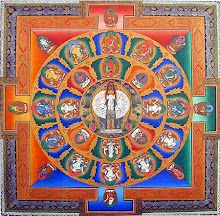




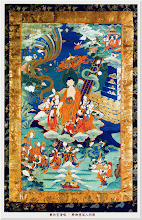

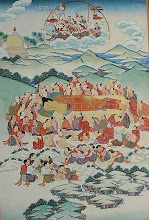


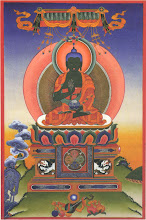




.jpg)

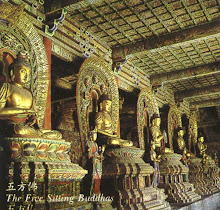













No comments:
Post a Comment